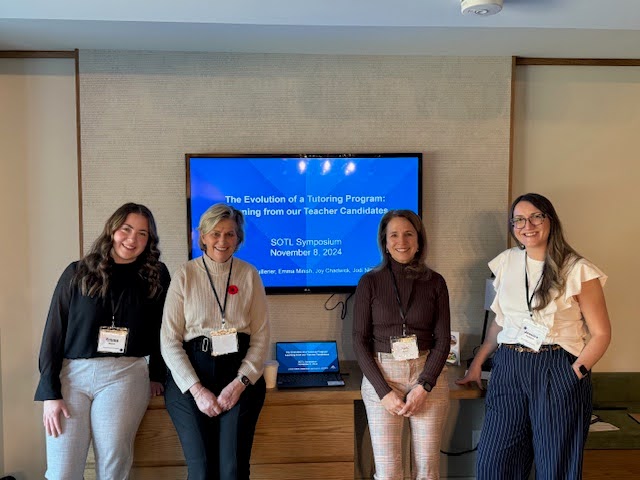Department of Education at the 2024 SoTL Conference
The Mokakiiks Centre for Scholarship of Teaching and Learning at Mount Royal University hosted its annual conference in Banff, Alberta, from November 7-9, 2024. Several faculty members from the Department of Education presented their research at this conference, including Joshua Hill, PhD, the keynote speaker.
In addition to the keynote presentation, Dr. Hill presented on Supporting Teacher Candidate Wellness: Findings from a Two-Year Study. The presentation shared research showing that rates of stress and burnout in the teaching profession are increasing (Harmsen, et al 2017; Li et al; 2022; Beutel, 2019). Additionally, he shared findings from the second year of the two-year design-based research study, highlighting decisions faculty members made to address teacher candidate burnout in their course design.
In his third presentation, Joshua presented with the students from his spring 2024 field school course. The presentation, “Land based learning as decolonization: Storying our Métis Experience field school journey” focused on how decolonization can be enacted within the colonial confines of the University. Along with his students, they sought to reframe this paradox by taking their learning out on the land to historic Métis cultural sites and learning from Métis people and their animal and plant relatives. In this session, professors Dr. Joshua Hill and Dr. Vicki Bouvier and students Robyn Deschamps, Jared McNabb, and Rachel Kmet Gilliat chronicled their Métis Experience field school journey along the North Saskatchewan River. They reflected on what they learned about decolonizing higher education through Indigenous land-based learning.
Dr. Shannon Kell’s presentation, “University Students' Perceptions of a 30-minute Break During Class: A Realistic Practice for Wellness?” also addressed teacher candidates' well-being. Dr. Kell’s study aimed to reframe how we think about breaks; can we reconsider breaks as enabling our best work instead of only focusing on losing time to a break? This SoTL study aimed to discover how teacher education students engaged with a 30-minute unstructured break during a weekly three-hour lecture. Cognitive fatigue and resulting stress accumulation have adverse effects on wellness. Pausing a cognitively demanding task and taking a break can reverse the strain reaction and support sustainable, long-term wellness. However, taking an effective break is often tricky because it can be perceived as a waste of time. Using pre and post-surveys, weekly logs, and a post-course focus group, Dr. Kell’s study found that 100% of participants valued the break. Findings revealed that taking breaks was valued and beneficial, and participants were motivated to continue this practice professionally.
Dr. Jodi Nickel and Dr. Joy Chadwick presented their findings from their tutoring program with teacher candidates Jessica Cuillerier and Emma Minish. The presentation “The Evolution of a Tutoring Program: Learning from Our Teacher Candidates” presented findings on how teacher candidates (TCs) have learned from tutoring young readers in schools as part of their course-embedded field experience. Changes to the Alberta ELA curriculum and emerging research regarding the teaching of reading prompted a significant revision of their course design and tutoring framework. Their data, collected from tutoring assignments and interviews, aligned with previous research demonstrating many benefits of tutoring for TCs’ learning. However, they were especially interested in better scaffolding their identified challenges so more TCs could excel. Their research helped them identify assumptions they were making about TC understanding and to continuously improve the learning experiences they provide to empower them as teacher leaders.

Emma Minish, Joy Chadwick, Jodi Nickel and Jessica Cuillerier

